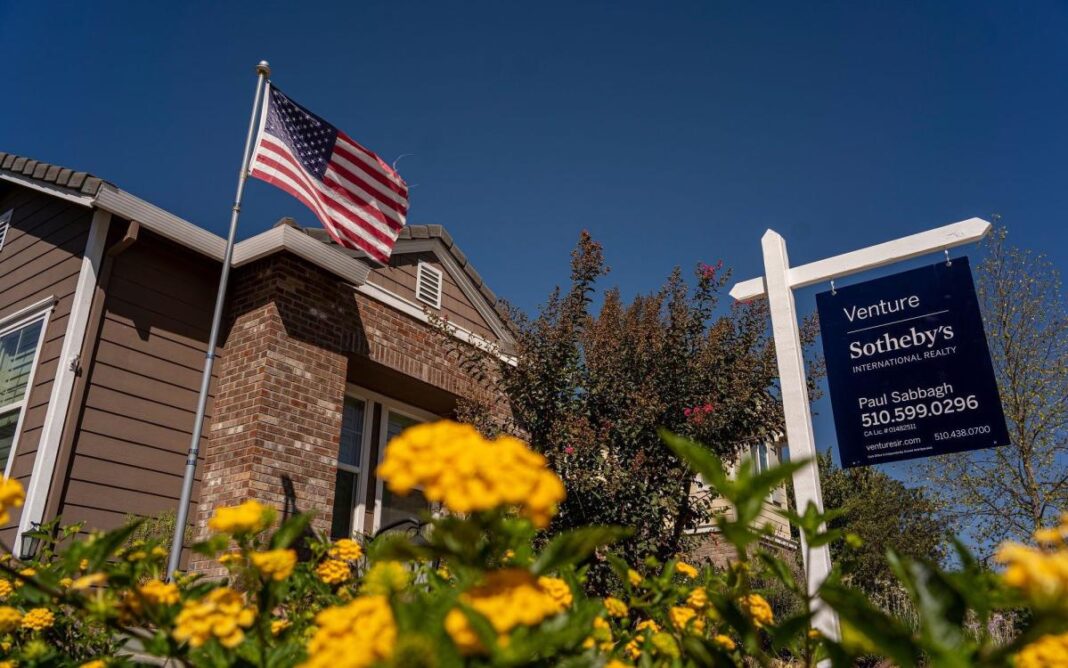The pound has benefited from a slump in the dollar this afternoon following the sharpest slowdown in US house price growth on record.
Sterling surged 1.86pc higher to $1.1487 against the safe haven currency after official data revealed America’s housing market has begun to slump under the weight of steep borrowing costs. The euro also benefited, climbing 1pc against the dollar to 0.9969.
US house prices grew 13pc in the 12 months to August, down from 15.6pc in July, according to an S&P index, the biggest drop in the index’s history.
Economists had expected US house price growth to hit 14.4pc. They blamed the Federal Reserve’s sharp increases in rates as it seeks to combat rocketing inflation for shutting would-be buyers out of the market with more expensive mortgages.
“The forceful deceleration in US housing prices that we noted a month ago continued,” Craig Lazzara, a managing director at S&P Dow Jones Indices, said. “Given the continuing prospects for a challenging macroeconomic environment, home prices may well continue to decelerate.”
George Ratiu, manager of economic research at Realtor.com, added: “As we move into the colder months of the year, we can expect further declines in home sales and continued downward adjustment in prices.”
The Fed has raised US rates to 3.25pc after three consecutive 0.75 percentage point increases.
Follow the latest updates below.
05:08 PM
Female barristers paid £30,000 less than male counterparts
Female barristers earned about half as much as their male colleagues last year when working on high value, complex financial disputes, according to new gender pay gap data that shows women earn less than men across almost all areas of law.
Across the sector, women barristers earned 34pc less than men in 2021, a slight improvement on the previous year, the Bar Council said. While the disparity remained wide or reduced slightly in most areas, men earned more than double in high earning practice areas such as personal injury, commercial and financial services.
04:24 PM
Made.com on the brink
Made.com is on the brink of collapse after talks between the struggling furniture retailer and potential bidders collapsed.
The company added it is no longer in receipt of funding proposals or any possible offers for a potential sale.
“The company may determine that it is appropriate to request a suspension of listing of the company’s ordinary shares on the London Stock Exchange’s Main Market for listed securities,” Made.com said in a statement.
03:09 PM
UK borrowing costs now cheaper than before mini-Budget
The Government is paying less interest on 30-year debt now than it was before the mini-Budget, as order appears to have been restored in what had been the most chaotic part of the financial system for a time at the end of September and the early days of October.
Yields on 30-year gilts have fallen to 3.64pc, which is down from a peak of almost 5.1pc on the market’s worst days of both September 28 and October 12.
It is also below the 3.75pc charged at 9.30am on Friday 23 September, when Kwasi Kwarteng stood up to deliver his ill-fated mini-Budget.
The surge in yields, sparked by factors including the extent of the Government’s borrowing plans and the lack of a reassuring forecast from the Office for Budget Responsibility, in turn set off a run on parts of the pensions market as liability-driven investment (LDI) funds were forced to dump long-dated gilts.
This crisis appears to be over, following intervention from regulators including the Bank of England to pump more liquidity into the market to allow LDI funds to restore their financial positions.
However yields on five- and 10-year gilts are still a little above their level when Kwarteng gave his mini-Budget statement.
02:38 PM
Bank of England official accuses Government of lack of ‘respect’ over mini-Budget
A top Bank of England official has accused the Government of failing to respect crucial institutional procedures in its disastrous mini-Budget.
Liz Truss and then-Chancellor Kwasi Kwarteng faced criticism for firing permanent secretary to the Treasury Tom Scholar and dispensing with traditional OBR forecasts ahead of a huge package of unfunded tax cuts that sparked turmoil in markets.
Speaking at an Office for National Statistics conference, Bank of England chief economist Huw Pill praised the relationship between the central bank and the statistics body.
He said it was “open, informative, even if on occasion challenging, yet at the same time it is respectful of the different responsibilities and institutional independence of the two bodies involved”.
In a veiled attack on the Government, Mr Pill said this was a “model” for how policymakers should respect the institutional framework, adding: “In my view we might have benefitted in recent weeks if the interactions amongst other institutions had followed that pattern.”
02:01 PM
Pound and bonds lose steam as traders await fiscal plan
The pound struggled to extend gains and government bonds slowed their advance as investors waited for details of Rishi Sunak’s fiscal plans.
Gilts trailed German peers, with the yield on 10-year bonds slipping 4.5 basis points to 3.69pc.
Meanwhile, the pound was up 0.5pc against the dollar at $1.1320, but held below the high hit yesterday when Sunak was confirmed as prime minister.
01:46 PM
Ryanair boss hails exit of ‘Brexiteers’ and urges free trade deal
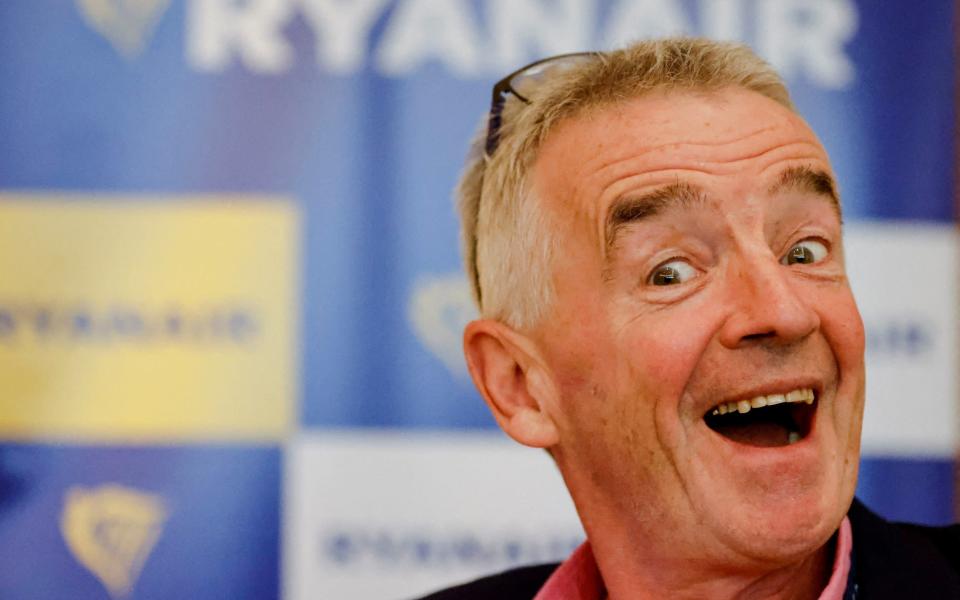
Ryanair boss Michael O’Leary has said he’s glad the “Brexiteer wing” of the Government was on its way out under Rishi Sunak and called for a trade deal with Europe to end post-Brexit turmoil.
The outspoken chief executive said he was glad “adults have taken charge again”.
Mr O’Leary told Reuters: “They are getting rid of some of the people who were there, from Boris Johnson to Liz Truss, all the Brexiteer wing of the Tory party – they are crazies.
“We all accept that we left the EU. Brexit is done but at least have the best free trade deal you can have. Europe is still the UK’s largest trading partner.”
The Irishman, who last week described the economic situation in Britain as a “car crash” caused by Brexit, said he hoped Sunak’s first decision would be to rejoin the free trade agreement.
01:28 PM
The four food items that are cheaper than last year
Bargain hunters can still find cheap orange juice and minced beef, which are among a handful of value-range items that have fallen in price over the past year, official analysis shows.
Szu Ping Chan reports:
Price matching and increased competition among supermarkets means the cost of the cheapest rice and sugar is also roughly the same as a year ago, according to the Office for National Statistics (ONS).
However, the ONS data also showed the cost of low-priced items like vegetable oil, pasta and tea shot up by as much as two-thirds in the year to September, soaring as much as their more expensive equivalents.
Its experimental analysis, which is based on prices scraped from supermarket websites, showed the price of the average 500g pack of value minced beef fell to £1.95 in September, down 7.4pc from £2.10 a year ago.
Tesco is among the bigger supermarkets that have started to price match German discounter Aldi as the rising cost of living forces families to make changes to their weekly shop.
Britain’s biggest supermarket now sells a packet of minced beef for £1.79, a price drop that has been matched by Sainsbury’s, which is also tracking Aldi prices.
12:39 PM
Market turmoil forces City workers back to office
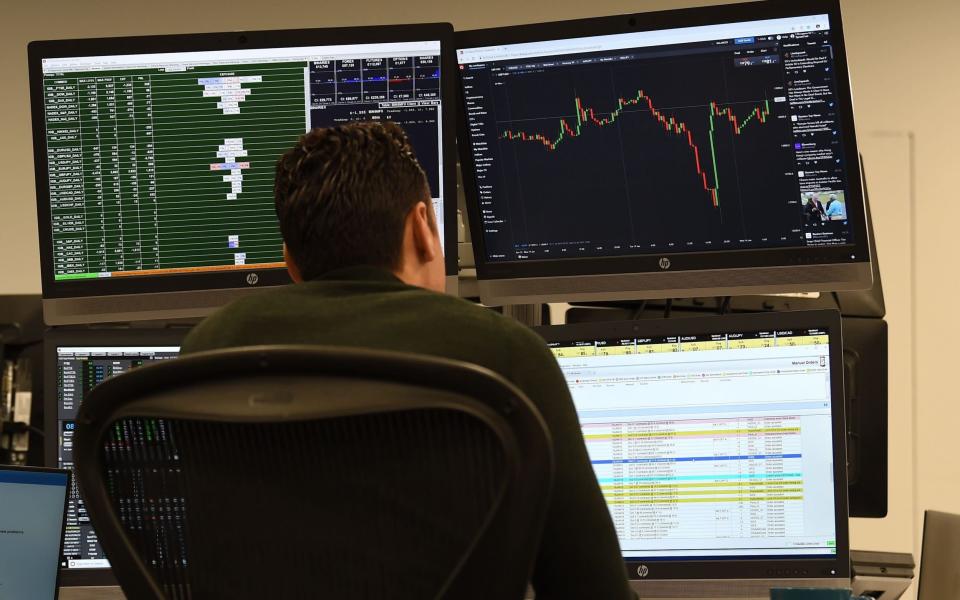
City of London workers have returned to their desks in the biggest numbers since the pandemic as employers push staff to spend more time in the office amid market turbulence.
More than three in four workers in the financial district were back at their workplace on October 13, according to data compiled by Google.
The resurgence may have been prompted by turmoil in markets, with the pound crashing to a record low before surging by the most in two years amid chaotic announcements by the Government.
However, attendance is still lower on Mondays and Fridays, suggesting many workers are only commuting in three days a week.
12:28 PM
Boris Johnson calls for Tory party to rally behind Sunak
Boris Johnson has congratulated Rishi Sunak on his appointment as Prime Minister and urged the Tory party to unite behind him.
12:18 PM
Eurozone bond yields drop ahead of ECB meeting
Eurozone bond yields fell again this morning as investors questioned how much further the European Central Bank will be able to lift interest rates after an expected 75 basis-point hike on Thursday.
German and Italian yields slid for a second consecutive session in the wake of reports last week that Federal Reserve officials are debating whether to slow the pace of interest rate increases in December.
A fall in natural gas prices, weak European economic data and calmer British markets also added to hopes that the ECB would end up raising rates less aggressively than previously thought, analysts said.
12:04 PM
Rishi Sunak: I’ll fix the mistakes of Liz Truss
Rishi Sunak has just delivered his first speech as Prime Minister after being formally appointed to the role in a meeting with King Charles.
The new PM said he would place “economic stability and confidence at the heart of this government’s agenda”. But he warned: “This will mean difficult decisions to come.”
He also took aim at the blunders of his predecessor Liz Truss and pledged to fix them.
Mr Sunak said: “She was not wrong to want to improve growth in this country. It is a noble aim. And I admired her restlessness to create change.
“But some mistakes were made – not born of ill will, or bad intentions. Quite the opposite, in fact. But mistakes, nonetheless. And I have been elected as leader of my party and your prime minister, in part to fix them.”
11:40 AM
Gas prices steady after warm weather slump
European gas prices edged above €100 a megawatt-hour after a slump over the previous two sessions driven by forecasts for mild weather.
High temperatures are expected to persist into November, with some European cities forecast to see temperatures that are closer to a summer day.
That’s reducing demand for heating and allowing more gas to be put into storage sites, building up reserves for winter.
EU leaders are also in discussions about a price cap on gas, though the bloc is still yet to reach an agreement.
Benchmark European gas prices rose 0.8pc after dropping as much as 6.8pc earlier in the day. The UK equivalent slipped 0.1pc.
11:12 AM
Huw Pill depends CPI as inflation target
Bank of England chief economist Huw Pill has launched a staunch defence of the current inflation target, saying that any goal had to reflect the everyday experience of the British public.
Speaking at an ONS conference this morning, Mr Pill rejected calls for a switch to a measure that excludes the volatile energy and food components, which have driven inflation into double digits.
He said: “For people, it would be quite weird now to be told, don’t worry, inflation is not 10pc, it’s only 5pc, because we’re excluding these things.
“I think that’s a danger. I do think the CPI does a pretty good job of being a broad index.”
The BoE has faced criticism amid sky-high inflation, with former PM Liz Truss even floating the possibility of widening its remit.
Mr Pill said monetary targets and the tools used to achieve them had to command widespread trust.
11:04 AM
UBS profits beats estimates thanks to interest rate rises
UBS has followed rival HSBC in reporting a boost from higher interest rates, enabling the Swiss bank to confirm plans to return around $5.5bn (£4.9bn) to investors this year.
UBS posted net income of $1.7bn in the three months to the end of September, beating estimates. Its wealth management unit saw lending revenue jump amid client inflows of $17.1bn, while investment banking revenue slumped.
Shares in the Swiss lender rose as much as 5.8pc. The bank said share buybacks should reach about $5.5bn this year, ahead of previous guidance of $5bn.
Chief executive Ralph Hamers is leading efforts to boost automation, slim down management and expand UBS’ presence in the US.
In a statement today he said: “The macroeconomic and geopolitical environment has become increasingly complex,” adding that global uncertainty “may also affect client activity levels in the fourth quarter”.
10:45 AM
Mortgage rates hold near 14-year high as Sunak takes reins
UK mortgage rates remain close to highs last seen during the 2008 financial crisis as the country fears up for its third prime minister in seven weeks.
The average two-year fixed-rate loan dipped slightly to 6.54pc this morning after last week breaching 6.65pc for the first time since August 2008.
The average five-year fixed-rate deal also fell to 6.4pc, but remains at its highest since November 2008, according to data from Moneyfacts.
The sharp rise in mortgage costs will be one of the key issues to address for Rishi Sunak as he takes over from Liz Truss.
The jump is starting to take its toll on house prices and is piling more pressure on strained household budgets.
10:22 AM
Adidas ‘plans to end’ Kanye West partnership over ‘offensive’ behaviour

Adidas is said to be planning to cut ties with Kanye West after a spate of offensive behaviour by the rapper.
The German sports giant may announce the move as soon as today, Bloomberg reports.
Adidas would join other brands including Gap and Balenciaga in ditching West – now known as Ye – following controversial statements, including anti-semitic social media posts, in recent weeks.
Adidas shares fell as much as 3.2pc in Frankfurt to their lowest since April 2016.
The company has been deliberating for weeks over whether to axe Kanye. Over the past decade it has built the rapper’s Yeezy line into a brand accounting for as much as 8pc of total sales.
10:01 AM
German business confidence improves before ‘difficult winter’
German business confidence improved in October but remained at low levels as Europe’s largest economy heads into a tough winter.
A gauge of expectations released by the Ifo institute rose to 75.6 from a revised 75.3 in September. Economists had predicted a further drop.
However, an index of current conditions slipped.
Clemens Fuest, Ifo President, said: “Companies were less satisfied with their current business. Their expectations improved, but they are still worried about the coming months. The German economy is facing a difficult winter.”
09:39 AM
How far-right Italy became an economic time bomb
Like many chief executives, Angelica Donati is struggling to see how her business can navigate this winter as energy bills soar, writes Giulia Bottaro.
“We’re very worried for the future,” says the chief executive of Donati Immobiliare Group, a Rome-based construction company. Getting through the crisis “doesn’t depend on us”, she says.
“From inflation and materials costs and energy, but also on the remedies the government will put in place. That’s completely out of our control… [It] is like in a boat with nobody at the helm in the sense that we have no control over these elements.”
Donati’s worries are far from unique as Europe heads into a bleak winter without Russian gas. However, her business is at one of the epicentres of the unfolding crisis.
09:22 AM
Pound and gilts climb as markets await fiscal plan
The pound inched higher while UK gilts extended gains as investors wait for more details on economic and fiscal policy from new Prime Minister Rishi Sunak.
The pound edged 0.2pc higher against the dollar to $1.1300, holding most of its gains made since late last week when Liz Truss announced her resignation. Against the euro it was up 0.3pc at 87.30p.
Meanwhile, the yield on 10-year government bonds dipped 3 basis points to 3.7pc.
Investors are betting that former Chancellor Sunak will restore credibility following Ms Truss’s disastrous time in office.
Mr Sunak will be sworn in as prime minister later today and is expected to keep Jeremy Hunt as Chancellor.
09:08 AM
WhatsApp outages reported across the globe
WhatsApp has stopped working across the world, with users in the UK, India, South Africa and Asia reporting issues with sending and receiving texts and videos.
A spokesman for parent company Meta said: “We’re aware that some people are currently having trouble sending messages and we’re working to restore WhatsApp for everyone as quickly as possible.”
Downdetector said more than 68,000 users across the UK had reported an outage, while the numbers stood at 11,000 in India and 19,000 in Singapore.
09:06 AM
Premier Inn owner swings back to profit but warns on costs
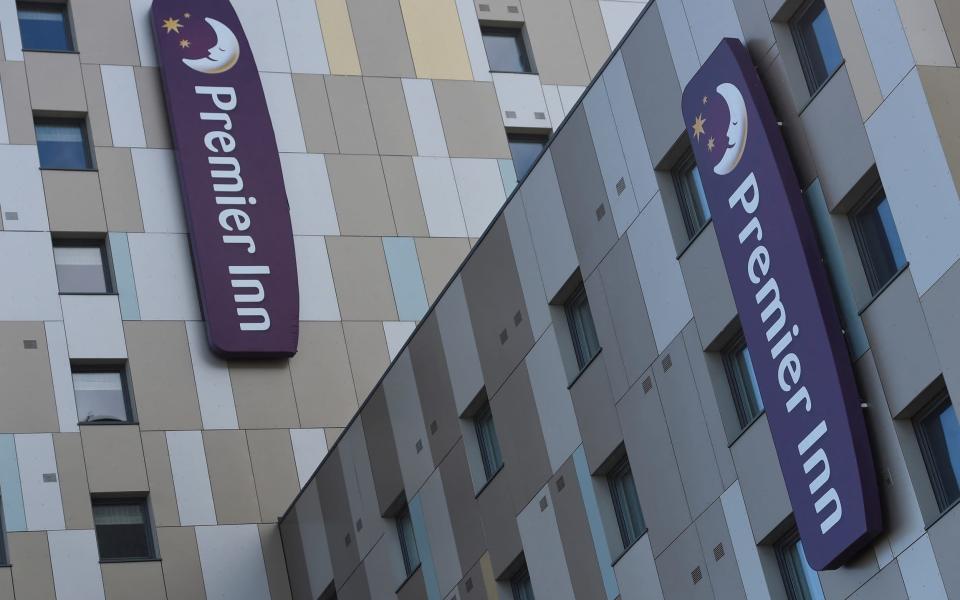
The owner of Premier Inn has swung back to a profit, but soaring costs are holding the group back from pre-pandemic levels.
Whitbread reported pre-tax profits of £307m in the six months to the end of September, a sharp jump from the £19.3m posted last year.
It marks a strong turnaround from the depths of lockdown, but parts of the business still have some way to go.
Soaring inflation and higher investments in IT and marketing mean costs are set to rise by £60m in the current financial year.
Whitbread said:
The UK value pub restaurant sector remains challenging and food and beverage sales continue to lag pre-pandemic levels.
We have launched a series of initiatives to return sales to pre-pandemic levels, although this is unlikely to be achieved in the current financial year.
08:53 AM
THG shares jump as it secures fresh loan
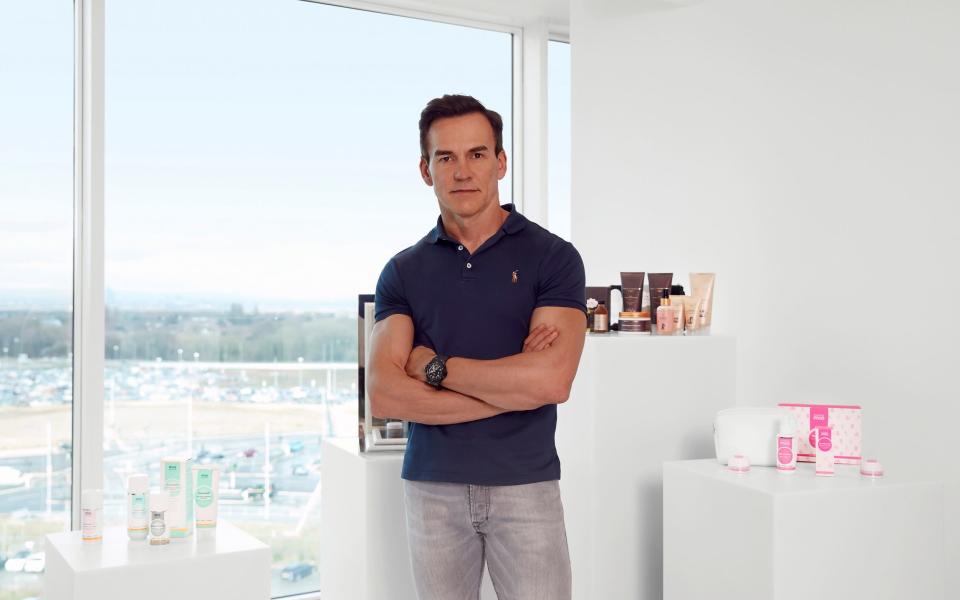
Shares in THG soared as much as 17pc in early trading after the troubled ecommerce group agreed a fresh £156m banking facility with its lenders.
THG said the new lending was a “strong endorsement” of its long-term business plan. The company said the fourth quarter had got off to a positive start and it expects to grow margins in 2023 as commodity prices ease further.
Chief executive Matthew Moulding said: “As cost-of-living pressures rise, customers are continuing to prioritise beauty, health and wellness categories.”
THG is sticking to its lowered outlook for the year with profits falling below 2021 levels to between £100m and £130m and revenue growth of between 10pc and 15pc.
As well as weaker consumer sentiment, THG has seen steep hikes in raw material costs, including whey for the its protein shakes.
It’s the latest blow for the group, which has seen its shares slide 75pc this year amid unrest from investors over its business model and governance.
08:37 AM
FTSE risers and fallers
The FTSE 100 is lagging in early trading as a burst of optimism following Rishi Sunak’s selection as prime minister quickly faded.
The blue-chip index fell 0.4pc after closing at its strongest level in two weeks on Monday.
HSBC was the biggest drag, tumbling more than 5pc. The bank reported a jump in profits thanks to higher interest rates, but set aside more than expected for potential loan losses as the economic outlook darkens.
That dragged down shares of rival Standard Chartered, while Premier Inn owner Whitbread lost 1.6pc as it warned of higher costs due to inflation.
The FTSE 250 rose 0.2pc, with Jupiter Fund Management jumping 7pc.
08:24 AM
EU warns gas price cap needs UK support
A number of EU countries are pushing for a price cap on natural gas, but the bloc’s executive arm has warned any step must avoid boosting demand or subsidising electricity to foreign countries including Britain.
The European Commission is advising members that any price limit would have to be extended to power-importing countries like the UK and Switzerland for it to be effective, Bloomberg reports.
Alternatively, the EU would have to export electricity at a higher price than in domestic trades – a move prohibited in a number of international agreements with partners.
A cap on gas prices is top of the agenda as the bloc tries to tackle an unprecedented energy crisis sparked by a cut-off in supplies from Russia.
The Commission’s warning comes ahead of a key meeting of ministers later today.
08:13 AM
HSBC boss: Sunak must keep UK competitive
Rishi Sunak’s selection as prime minister will help to calm markets, but he must focus on keeping London competitive as a global financial centre.
That’s according to Noel Quinn, chief executive of HSBC, who said: “We’re very pleased that there has been a decision taken on the UK Prime Minister position, that now allows the markets to stabilise as you can see in the way the markets reacted yesterday, that’s positive.”
Mr Quinn said Sunak’s Government should work with the financial industry to ensure Britain’s regulatory environment remains globally competitive, while not sacrificing its reputation for prudence.
He told Reuters: “There are some areas where I think there is potential for improvement to drive greater competition,” adding that he welcomed moves to embed competitiveness into regulators’ objectives.
“It’s important for the City of London to remain competitive with regulatory environments around the world.”
Mr Sunak, who will be formally appointed by King Charles today, has said the country is facing a “profound economic challenge” and will be tasked with restoring financial credibility following Liz Truss’s brief and disastrous tenure.
08:01 AM
FTSE 100 opens lower
The FTSE 100 has dipped at the open as Rishi Sunak prepares to take over as prime minister.
The blue-chip index fell 0.2pc to 7,000 points.
07:51 AM
Apple increases music and TV prices for first time since launch

Apple has increased prices for its music and TV services for the first time in a move that could boost rivals in an increasingly competitive market.
The iPhone maker increased the price of Apple Music by $1 to $10.99 for individuals effective immediately, making it more expensive than both Amazon and Spotify. Shares in the Swedish music streaming company surged as much has 9.4pc.
The price of Apple TV+ will climb from $4.99 to $6.99, though this remains lower than rivals such as Netflix and Warner Bros Discovery.
The tech giant said the music price hike was due to “an increase in licensing costs” and that artists and songwriters will now earn more money.
Apple’s push into streaming marks its efforts to generate more revenue from services. The division now generates nearly a quarter of the company’s total sales – up from less than 10pc in 2015.
07:43 AM
Surge in food staples hits family budgets
The cost of low-priced items like vegetable oil, pasta and tea have shot up over the past year as value ranges soar as much as their premium equivalents, according to the Office for National Statistics (ONS).
Szu Ping Chan has the details:
The price of the cheapest vegetable oil was 65pc higher in September compared with a year ago, while pasta is up 60pc, the experimental analysis shows.
Tea is up almost 50pc among value ranges, it added.
Budget orange juice, minced beef and rice were among the few items that have fallen in price over the past 12 months.
The ONS started taking a closer look at the figures after food poverty campaigner Jack Monroe raised concerns that poorer families were being hit by faster increases in prices of value items.
The experimental analysis, collected by “scraping” around 1.5m prices from supermarket websites, suggested this was not the case.
“Crucially, these large rises in the cheapest available items are broadly in line with the average food price rises reported within the ONS’s regular headline inflation measures,” the ONS said.
However, Sir Ian Diamond, the National Statistician, said families who bought the lowest priced items were unable to cushion the impact of price rises by trading down.
He told the BBC’s Radio 4 Today Programme: “There isn’t further to go down, so they can be impacted quite a lot. Very, very few things are going down [in price] at all. The squeeze on people who buy the lowest cost things is pretty hard at the moment.”
07:31 AM
Watchdog launches new crackdown on greenwashing
The City watchdog has launched a fresh assault on greenwashing with proposed restrictions on asset managers using terms such as “green” and “ESG” in fund marketing.
Rules due to be unveiled by the Financial Conduct Authority today include using a set of three fund labels to differentiate between different types of “green investments” and setting a higher burden on firms to prove their ESG claims.
The proposals target fund marketing and aim to ensure access to consumer-friendly ESG labels, the Financial Times reports.
The FCA and other regulators around the globe have been cracking down on greenwashing, where investment managers make unsubstantiated environmental claims about their products.
07:19 AM
Bank of England in talks with Treasury to avoid Halloween Budget meltdown
The Bank of England is locked in talks with Treasury mandarins to avoid a market meltdown over the Halloween Budget as Rishi Sunak seeks to restore order in Downing Street.
Tim Wallace and Eir Nolsoe have more:
Sir Dave Ramsden, a deputy governor at the Bank, said that his officials are discussing the cost of any future energy bailout scheme ahead of what is expected to be a bleak update on the public finances.
It came as government borrowing costs fell sharply in a sign that traders believe the incoming Prime Minister Mr Sunak will bring spending under control.
However, a closely-watched survey of business activity suggested the country is now in recession.
Speaking to MPs on the Treasury Select Committee, Sir Dave said: “We are already engaging with Treasury officials who in turn are engaging with the Office for Budget Responsibility (OBR) on the elements that will go into the 31 October announcement.
“A particularly important one for us is what the new energy price guarantee will look like.
“That will be a key element. It will have a bearing on the path of inflation.”
The current energy price scheme limits household bills to £2,500 but will come to an end in April and be replaced by a more targeted scheme that is still being drawn up.
06:55 AM
Sunak expected to keep Jeremy Hunt as he prepares new Cabinet
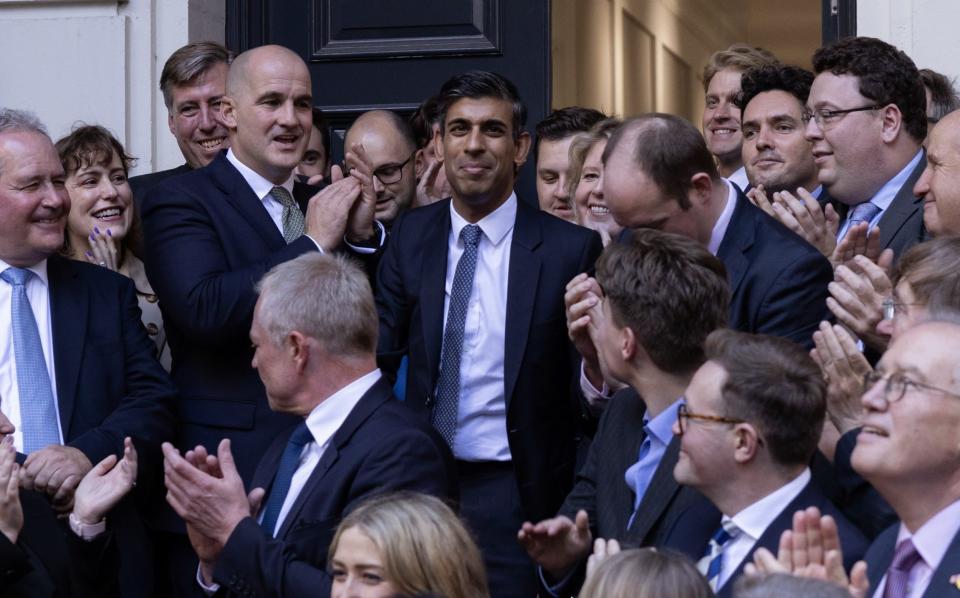
Rishi Sunak is expected to keep Jeremy Hunt as Chancellor as he tries to calm markets and form a united Government when he takes over as prime minister today.
Mr Sunak will formally take over from Liz Truss following a meeting with King Charles, before addressing the nation and appointing members of his Cabinet.
He’ll have to balance rewarding loyalists who backed his leadership campaigns, while ensuring unity by including MPs from different sides of the party.
The new PM’s aides held talks yesterday after he promised MPs he would lead a “Government of all the talents”. He’s expected to push ahead with Mr Hunt’s plans for a fiscal statement setting out spending plans on October 31.
06:44 AM
Rising interest rates boost HSBC profits
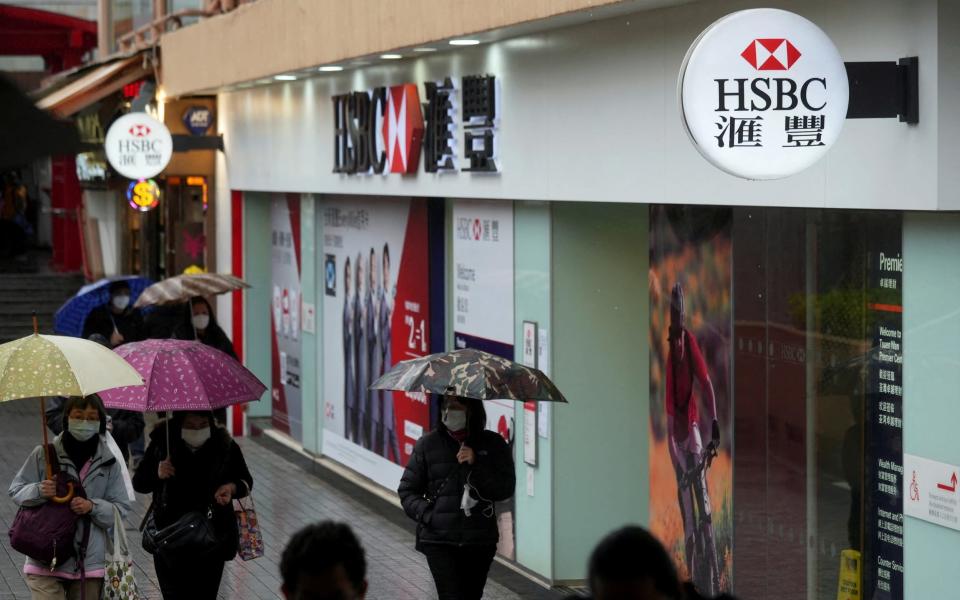
HSBC has posted better-than-expected profits for the third quarter as rising interest rates boosted its margins on lending.
The bank said net interest income – a key measure of profitability – hit $8.6bn (£7.6bn), its best third quarter in more than eight years. This helped lift pre-tax profit by 18pc to $6.5bn.
Noel Quinn, chief executive of HSBC, said: “Our strategy produced good organic growth in all three global businesses, and net interest income increased on the back of rising interest rates.
“We retained a tight grip on costs, despite inflationary pressures, and remain on track to achieve our cost targets for 2022 and 2023.”
HSBC, which is fending off calls for a breakup from Chinese shareholder Ping An, is the first major UK bank to report figures for a turbulent third quarter.
05:19 AM
Good morning.
Rishi Sunak’s economic approach will lead to a deeper recession than previously thought but will keep a lid on interest rates, according to a top City economist. Thomas Pugh at RSM said the new prime minister’s pledge for fiscal responsibility suggests the country could be facing a fresh wave of austerity.
Combined with the cost-of-living crisis and rising rates, this could lead to a recession deeper than the 2pc previously forecast, he said. However, lower fiscal spending is likely to keep down inflation in the medium term, meaning the Bank of England won’t need to raise interest rates as aggressively.
5 things to start your day
1) Gas prices drop to lowest level since June as hopes grow of mild winter – Fall is likely to boost public finances by reducing cost of energy bailouts
2) Britain is ‘doomed’ and will need IMF bailout, says billionaire investor Guy Hands – Terra Firma founder says UK is on the path to becoming a ‘sick man of Europe’
3) Surging inflation triggers biggest wave of profit warnings since financial crisis – Public companies struggling to stay afloat as City watchdog investigates impact of market turmoil on private equity
4) Paris dims the lights as blackouts threaten disaster for Macron – Years of underinvestment in its aging nuclear fleet risk causing chaos in France this winter
5) Manufacturing costs drop as supply chain chaos subsides – Consumer demand is rapidly cooling as global economies head into recession
What happened overnight
Asian equities fell to new two-and-a-half-year lows on Tuesday as early gains inspired by a rally on Wall Street on hopes the Federal Reserve could be nearing the end of aggressive rate increases were offset by weakness in Chinese shares and the yuan.
The US dollar eased against major peers, while sterling took aim at this month’s highs after Rishi Sunak was set to become Britain’s next prime minister.
Sterling strengthened 0.3pc to $1.13170, heading towards the high this month of $1.1493 from October 5.
Equities were mixed in Asia, with Japan’s advancing 0.7pc and South Korea rising 0.3pc but Taiwan was down 0.7pc and Hong Kong shed 0.6pc.
MSCI’s broadest index of Asia-Pacific shares lost 0.4pc to 428.2 after dipping to 427.4, the lowest since April 2020.
